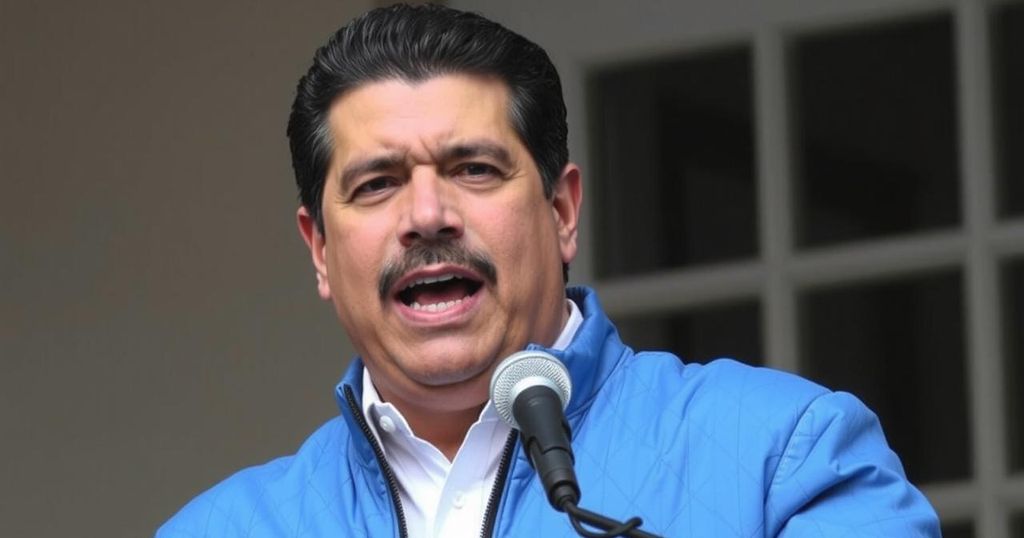Venezuelan President Nicolás Maduro was sworn in for a third term despite credible evidence showing his opponent, Edmundo González, won the election. The inauguration was heavily policed, with Maduro accusing the opposition of trying to undermine his presidency. International criticism mounted due to allegations of electoral fraud, and sanctions were imposed on Venezuelan officials by the European Union. Protests following the elections resulted in arrests and violence, leading to condemnation from global leaders.
Venezuelan President Nicolás Maduro was sworn in for a third consecutive six-year term, signaling the continuation of his controversial leadership until 2031. This inauguration took place amidst substantial evidence indicating that his electoral opponent, Edmundo González, secured a larger number of votes in the recent election held July 28, which has been widely criticized due to a lack of transparency. During the swearing-in ceremony at Venezuela’s legislative palace, heavily fortified by security forces, Maduro delivered a defiant speech, labeling attempts by the opposition to disrupt the inauguration as a failure and a triumph for his administration.
With opposition members claiming to have collected data suggesting González received double the votes above Maduro, external observers, such as the U.S.-based Carter Center, endorsed these tallies. Meanwhile, the European Union imposed sanctions on 15 key officials associated with the election process, including the president and vice president of Venezuela’s Supreme Court. The situation was exacerbated by anti-Maduro demonstrations, during which opposition leader María Corina Machado encountered security forces and was reportedly detained.
Amidst international outcries condemning electoral fraud and violence against demonstrators, Maduro’s administration maintained its stance, asserting that the election result was legitimate despite concerns over its integrity. The government’s filed audit request was met with skepticism, as no substantial evidence to support Maduro’s victory was provided, leading to widespread protests and arrests among demonstrators opposing his regime, with reports of deaths and torture emerging from custodial experiences.
On the day of the inauguration, Maduro’s supporters rallied in celebration, notwithstanding the political turmoil encompassing the event. Despite the international condemnation and claims of election misconduct directed towards the Venezuelan administration, Maduro remains resolute in his tenure, having reaffirmed his commitment to his government, distancing himself from claims of influence by foreign entities, particularly the U.S.
The unfolding political landscape in Venezuela continues to present significant challenges, with experts and international leaders closely monitoring the measures taken by both the Maduro regime and the opposition.
Venezuela has experienced profound political and economic crises over the past decade, culminating in severe opposition to the government of Nicolás Maduro. Following the controversial 2018 presidential election, both local and international observers expressed concerns about the fairness and transparency of the electoral process. Human rights violations, including repression of dissent and violent crackdowns on protests, have characterized Maduro’s administration. The electoral contest held on July 28 was met with similar allegations of misconduct, with significant opposition figures barred from participating and accusations of fraud raised by competing political factions. This tumultuous backdrop forms the context for Maduro’s recent inauguration amidst ongoing unrest and external scrutiny.
Nicolás Maduro’s recent swearing-in for a third term underscores the ongoing political strife in Venezuela, marked by allegations of electoral impropriety and the suppression of dissenting voices. The opposition’s claims of a fraudulent election, supported by external observers, alongside the imposition of international sanctions, highlight the legitimacy crisis enveloping Maduro’s leadership. As protests continue and the opposition rallies for recognition, the future of Venezuelan democracy hangs in a delicate balance amid increasing authoritarianism and civil unrest.
Original Source: www.newsday.com






